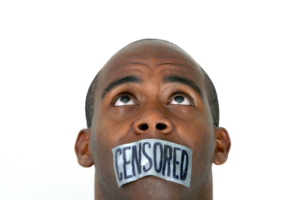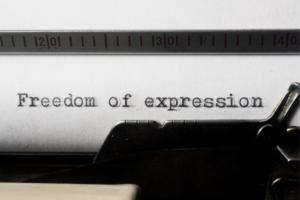 James Baldwin, Zora Neale Hurston, Alice Walker, Ralph Ellison, Richard Wright, Toni Morrison, and Alice Walker: What do they all have in common? They are all African-American writers who have published books considered American classics. And they are also authors whose novels are banned (or will be) by school boards and libraries across the United States.
James Baldwin, Zora Neale Hurston, Alice Walker, Ralph Ellison, Richard Wright, Toni Morrison, and Alice Walker: What do they all have in common? They are all African-American writers who have published books considered American classics. And they are also authors whose novels are banned (or will be) by school boards and libraries across the United States.
A new day clouded in dirty words.
Virginia Beach School Board Member wants books about race by Toni Morrison and Other Black Authors Banned from the School District and Public Libraries.
According to recent reports, books about race are on the chopping block in the public schools’ curriculum. Many books by Black Writers, considered American Classics, depict and incite racism. They are vulgar explanations of rape, incest, and very much perpetuated in racism.
(The tone of) Critical race: “Our students and teachers are exposed for too long that our country is innately racist. Racism pits teachers and students against one another based on their skin color.”
Silence is Golden
Accordingly, Maya Angelou is one of the most banned African American writers for her (autobiographical) debut novel: I Know Why the Caged Bird Sings. It deals with the rape and pregnancy of a black teenager and racism in America. Ms. Angelou’s book is an ongoing target for removal from school libraries’ reading lists.
“I’m always sorry that people ban my books. Many times I’ve been called the most banned,” Angelou said, referring to I Know Why the Caged Bird Sings, which was nominated for a National Book Award and remained on The New York Times paperback bestseller list for two years. “Many times my books are banned by people who never read two sentences.”
Virginia’s Republican GOP candidate released a political ad featuring a white mother who advocated banning Toni Morrison’s novel Beloved from school curriculums. The woman describes Beloved as “disgusting, gross, and written in the most vile and explicit language imaginable.” She said the book was extremely difficult for her to handle, and it gave her son nightmares.
Morrison’s Pulitzer Prize-winning novel Beloved tells the story of a family of former slaves. It is inspired by a true-life incident involving Margaret Garner, an escaped slave from Kentucky who fled to the free state of Ohio in 1856 but was captured in accordance with the Fugitive Slave Act of 1850. When U.S. marshals burst into the cabin where Garner and her husband had barricaded themselves, they found that she had killed her two-year-old daughter and was attempting to kill her other children to spare them from being returned to slavery. Morrison researched the historical account of Margaret Garner titled “A Visit to the Slave Mother who Killed Her Child” published in an 1856 newspaper article in the American Baptist.
Dana Williams, professor of African American literature at Howard University, says the fight over “parents’ rights” has become a racist dog whistle. “Books like Beloved force us to have real conversations about history,” she says (recently published in Truthout).
The below are touted books by white authors, banned by religious groups, conservatives, and school boards—yet Hollywood took a note of the massive readerships, profits, and literary recognitions and adapted them into significant motion pictures or television vehicles. One of the biggest prizes was the silent movie: Birth of a Nation.
- To Kill a Mockingbird
- The Adventures of Huckleberry Finn
- Of Mice and Men
- The Harry Potter Series
- Little House on the Prairie
The question: Why is RAP music using derogatory words and excessive profanity degrading women or movies given X or R ratings accepted? Why are social media bullying-lies, or shooting/killing an unarmed citizen seen as the victim’s fault? We have become a culture of picking and choosing when the shoe fits.
Are writers to be limited to happy-go-lucky stories bringing shallow substances and forgettable endings? A philosophy among fiction writers remains that the best prose is honest and written from the identified and familiar.
When books are banned, destroyed, and mocked, this is burning freedom of expression and creativity.
Stories are composed as symbols of the times within the writer’s life. Can we ease one’s experiences as a convenience for someone else’s?
I have read and collected many of the banned African American authors’ novels. My family instilled level-headed discussions. So I don’t consider myself damaged. Perhaps, if looking at the REAL reason WHAT brought the Africans to this country and what they endured, and still endure… then not banning their stories is the most human thing to do.


Great Blog Entry Cheryl. I am distributing it out.
Thank you so much Bill—-
There is no perfect place. However, the imperfections of this country has made it impossible to live with the understanding that so many ideas are discarded for everyone’s own good.
Dearest Cheryl: THANK YOU SO MUCH for this powerful post and alerting us to the damage being done by the practice of Critical Race Theory in our schools and beyond (at the ballot box, too). As a writer and former UCLA professor of writing, I find the banning of extraordinary works of fiction by African-American writers to be profoundly disturbing, nay, even infuriating and anti-American. Maya Angelou’s works have given me such succor over the years, as well as every one of the writers you name. To think others would be prohibited access to them is tragic.
Donna, as you were, for many years my writing coach; I learned to express a honest voice, making the reader think. What else can a writer do? I say it’s a shallow society that fears, lies, and censors.
Thank you for writing on an important subject. It’s quite apropos and disappointing after the outcome of the Governor’s race in Virginia.
If only…these tiny words have powerful meanings. Who knows what direction we, as a country, will venture in the future? I hope the present is not the shadow of what is ahead for the children.
Hello Cheryl! Thanks to Donna Pizzi for connecting us. This is a wonderful post and something I have paid attention to for a while now. I of course am appalled and disgusted at the slow but sure banning of so many beautiful classics that I grew up with – in fact were required to read in high school and college. I was honored to have studied the poetry of Maya Angelou in college with the lady herself. It was awesome.
I am convinced this effort to squelch the true study of much of this country’s history is a combination of latent embarrassment and outright denial. these people don’t want their children knowing the real truth of systemic racism. All those screaming the loudest are most probably racist themselves, whether they admit it or not. They might have to actually discuss the issue with their children!
Another equally important issue is the founding of this country on the slaughter of millions of native Americans! We could on and on about the denial and/or justification of those actions.
It is also an issue of misplaced guilt. In speaking honestly about it, I think they believe they are admitting guilt – which may be appropriate in some cases. Having lived in Germany for many years, I found that they have confronted the holocaust issues head on, admitted the horrific acts of their ancestors and taken actions to acknowledge them and prevent anything similar in the future. The current generation of Germans do not blame themselves!
I’ll close my rambling by mentioning the evangelical christian movement (lower case intentional) in America that has in some unfathomable way turned themselves into the supreme Aryan race.
Anyway, I love your writing and will continue to follow you! Thank you.
Michael, thank you so much for your profound words. I know, you know, when a blind eye stares back at itself, there is an ignorance of what is in front. I’m afraid the next generations are in perpetual darkness of this country’s history, and I’m not just talking about slavery. What an honor having Maya Angelou as your professor. There are people you meet along the way that leave you in awe, and she is one of them.
Thank you, Cheryl, for your important blog. I will share it! Also – I would like to share a quote with you by Gurdjieff that I believe is important for creative people to think about: “Ordinary people eat food and create shit. Real people eat shit and create food.” We have big problems today in our world – Creative people, like the authors you mention (James Baldwin, Toni Morrison, Maya Angelou) digested some real shitty experiences and created stories that provide FOOD for millions. Let’s engage our creativity! Thank you Cheryl!
Heather, what a great analogy. Writing from one’s own experience can’t be stamped out like a roach. I feel as time goes on stories not fitting into a certain mold will be silenced. I hope not…but….